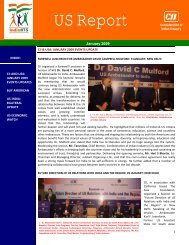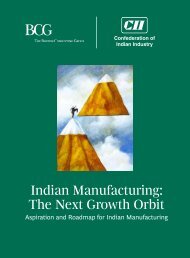Journal of Small Business and Enterprise - March, 2013 - CII
Journal of Small Business and Enterprise - March, 2013 - CII
Journal of Small Business and Enterprise - March, 2013 - CII
You also want an ePaper? Increase the reach of your titles
YUMPU automatically turns print PDFs into web optimized ePapers that Google loves.
TransformationMulti-Stakeholder BenefitsFDI in multi-br<strong>and</strong> retail will indeedbenefit industry, producers, kiranamerchants, consumers, <strong>and</strong> the workforcein very many ways. A <strong>CII</strong> survey <strong>of</strong> industryleaders revealed that an overwhelmingmajority (80 percent) <strong>of</strong> the respondentswere in favour <strong>of</strong> FDI in multi-br<strong>and</strong>retail. They also recognised that aliberal FDI policy will greatly benefit theMSME sector.FDI in multi-br<strong>and</strong> retail will alsodrive industry to adopt more consumerorientedpractices including closemonitoring <strong>of</strong> consumer preferences.Consumers who do their purchases atmodern outlets have experienced betterproduct quality, lower prices, one-stopshopping, choice <strong>of</strong> more br<strong>and</strong>s <strong>and</strong>products, better shopping experienceswith family <strong>and</strong> fresh stocks.Moreover, where safety is a key factor,consumers tend to opt for br<strong>and</strong>ed goodsthat are perceived as safe <strong>and</strong> conformingto government regulations. They are alsobetter protected against incidence <strong>of</strong>food adulteration.Organised retail with FDI participationwill help Government to systematicallyenforce the regulatory norms. Thereis greater transparency <strong>and</strong> ease <strong>of</strong>monitoring in the case <strong>of</strong> organised retail,which sets stringent st<strong>and</strong>ards that areexecuted through pre-defined processes<strong>and</strong> technology.<strong>CII</strong>'s considered view is that MSMEproducers will greatly benefit from thesourcing opportunities that stem fromFDI participation in the sector. Accordingto a <strong>CII</strong> survey, FDI in retail will push upsourcing from MSMEs to $298 billion fromthe present value <strong>of</strong> $157 billion.FDI in retail will also help MSMEsin terms <strong>of</strong> gross sales, new orders /contracts <strong>and</strong> overall growth.Besides, a liberal FDI policy will usherin advanced technologies <strong>and</strong> expertisethereby augmenting the supply chainmanagement <strong>of</strong> recipient firms. <strong>CII</strong>maintains that supply chain efficiencieswill help reduce wastage, such as seen infruits <strong>and</strong> vegetables production. This inturn will help government curb inflation<strong>and</strong> bring down the interest rates.FDI in multi-br<strong>and</strong> retail is expected toaugment the business prospects <strong>of</strong> some12 million kirana stores in the country.Merchants who are looking to scale upwill gain access to patience capital whichis relatively scarce in the country. Manymore br<strong>and</strong>s <strong>and</strong> products entering theIndian market can be retailed at thekirana stores.The kirana merchants will also gaineasier access to credit <strong>and</strong> financefacilities, logistics support <strong>and</strong> modernsystems <strong>and</strong> processes that drive upefficiency levels. Pertinent to note thatmany <strong>of</strong> the new-generation kiranamerchants are already using technologieslike mobility, e-commerce <strong>and</strong> socialmedia to run their business <strong>and</strong> meetcustomer expectations.Moreover, according to a <strong>CII</strong> survey,nearly 70 percent <strong>of</strong> the employees inthe retail industry see FDI as a growthopportunity for them. They believe theemployment levels will rise with neworders coming in from around the world.FDI in retail is likely to encourage firms tohire more. Dem<strong>and</strong> for contract labour toowill increase. So the notion about peoplelosing their jobs in the wake <strong>of</strong> FDI in retailis completely unfounded.Way ForwardKeeping in view the key benefitsthat FDI in multi-br<strong>and</strong> retail will likelydeliver, <strong>CII</strong> has recommended a set <strong>of</strong>steps <strong>and</strong> guidelines for seamless foreigninvestments in the sector. They are:Kirana stores can be organised intolarger cooperatives to make them moreattractive for investments.Encourage SMEs supplying to globalretail majors in India to focus upon thequality st<strong>and</strong>ards set by the majors, <strong>and</strong>help them gain deep underst<strong>and</strong>ing <strong>of</strong> thecomplex vendor management systems.Improve public <strong>and</strong> privateinfrastructure around multimodaltransport hubs, warehouses, distributioncenters, mismanaged supply chainswith cold-storage <strong>and</strong> other facilitiesdrive inefficiencies.Empower consumers throughawareness programmes, helping them setthe right expectations from all categories<strong>of</strong> br<strong>and</strong>s <strong>and</strong> products.Bring about changes in legal normssuch as those on zoning, store sizes,opening hours, import taxes whichcan shape the emergence <strong>of</strong> retail <strong>and</strong>select formats.Government <strong>and</strong> industry need to becognizant <strong>of</strong> the fact that FDI in retail cansometimes negatively impact consumers ifcorporate retailers adopt anti-competitivepractices such as predatory pricing. So,the Competition Act 2002 can be furtherstrengthened. Also protect consumersagainst predatory pricing.Simplify <strong>and</strong> streamline thelicensing <strong>and</strong> approval processes, createa single window clearance up to theextent feasible.Ensure uniform implementation <strong>of</strong>updated laws like APMC Act, etc.Update existing laws like Shops <strong>and</strong>Establishment Act to make it audit basedor self reporting.The retail industry in India facesmultiple challenges in terms <strong>of</strong> scale,employability <strong>and</strong> shortage <strong>of</strong> relevantskills. Managing this challenge requiresthe Government to create recognizedcourses <strong>and</strong> industry wide accreditationsfor basic training for entry level employeeswith pre-defined quality st<strong>and</strong>ards;provide an impetus to Governmenteducational establishments to introduceretail programs <strong>and</strong> extend incentives<strong>and</strong> support to retailers to create trainingbodies for development <strong>of</strong> employees.On a larger plane, organised retailindustry in India is expected to grow to$535 billion by <strong>2013</strong> with modern retail(organised retail) accounting for a 10percent share. Experts expect the industryto scale the $1,250-billion level by 2020.MSME <strong>Business</strong> <strong>March</strong> <strong>2013</strong>15
















